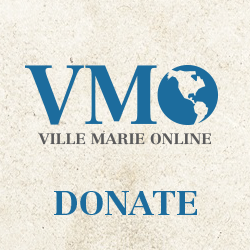I entrust you to the maternal care of our Mother who lives in the glory of God and is always by our side on our life’s journey.

All kids must know mom and dad
by Deborah Rankin
CHARTER CASE
One of the news stories that was barely a blip on the political radar in 2013 concerns the Charter case of Olivia Pratten, a Canadian journalist who challenged sperm donor anonymity in her home province of British Columbia. Pratten claimed that B.C.'s Adoption Act and Adoption Regulation, which provides mechanisms for adoptees to find their birth parents, violates section 15 of the Charter of Rights and Freedoms because it benefits adoptees, but not donor offspring.
CATHOLIC TEACHING
Her story is important for Catholics and people of faith generally because of its relation to bioethics, moral precepts about family life, and social justice. The Catholic Catechism states that techniques involving the donation of sperm or ovum, or the use of a surrogate uterus, "infringe the child's right to be born of a father and mother known to him." It goes on to say that, "A child is not something owed to one, but a gift" and "may not be considered a piece of property, an idea to which an alleged "right to a child" would lead."
The Catholic Church's view is unequivocal on the matter of whose interests should prevail in the ongoing legal battle between donor offspring and intending parents i.e. people who plan to have, or already have had, children through third-party conception. The Catholic Catechism states plainly that, "only the child possesses genuine rights."
Historically, Western law has been based on Judeo-Christian principles that entrenched kinship from natural relations of blood and marriage. This worldview is rooted in the Biblical narratives that put a lot of stock in filial rights and obligations.
TECHNO-SCIENCE
However, when techno-science upends the normal rules of social engagement, creating an artificial culture in which parents are "consumers" and pre-born humans are "products of conception" - this is the language of the reproductive technologies industry - it can become easy to dismiss the rights of born persons, as is the case with donor-conceived people.
BIBLICAL HERITAGE
From the Old Testament onward the Bible stresses the natural obligations of family connection. The New Testament account of Mary's visit to her elder cousin Elizabeth after the angel Gabriel appears telling her that she has conceived by the power of the Holy Spirit and will give birth to a son who will deliver Israel from its yoke of oppression is a testimony to the faith in family ties even under the most incredible circumstances.
The aging Elizabeth, wife of the prophet Zechariah, has herself experienced a miracle of sorts because she is six months pregnant and everyone had believed her to be infertile. Elizabeth is overjoyed at seeing her little cousin who is pregnant and unmarried, but legally "betrothed" i.e. engaged to Joseph, a direct descendent of King David. She tells Mary that "the child leapt in my womb" at the mere sound of her cousin’s greeting.
That child was John the Baptist, the cousin of Jesus, whose own ministry would pave the way for Jesus' redemptive message of peace, love, and salvation. Luke's Gospel account is interesting because it's told from the perspective of Mary's bewildered relative who wonders aloud, "Who am I that the mother of my Lord should come to me?" It reveals that kinship begins before birth, running down the generations across different family branches, and is a felt experience in which God is always present.
OLIVIA PRATTEN'S STORY
Olivia Pratten was born in Nainamo, B.C., in 1982, after her parents, who couldn't conceive on their own, went the unconventional route of using sperm from an anonymous donor to build a family. But the plan never completely gelled for Pratten who explained on FamilyScholars.org that she had yearned to know about her natural father since she was told at age five about the manner of her conception. "I never saw him as a sperm donor,' she said. "To me - instinctively - he was my biological father."
At 19, she asked the doctor who had administered the insemination procedure for more information about her donor dad but he refused to tell her anything. She went to court to press for disclosure about her bio-father's identity, only to discover that her medical records had been destroyed. According to the rules of the College of Physicians and Surgeons of British Columbia, Dr. Gerald Korn hadn't been obliged to keep her records for more than six years.
Thus began Olivia Pratten's odyssey through the legal system to try to get justice for other donor-conceived children although she was forced by a painful turn of events to give up her own dream of ever knowing anything about her other biological parent.
LEGAL-EASE
Initially, she was successful. Justice Elaine Adair, of the B.C. Supreme Court, struck down provincial legislation that protects sperm donor anonymity, specifically provisions that were deemed to unjustifiably violate section 15 of the Charter. "Based on the whole of the evidence," Adair writes, "assisted reproduction using an anonymous gamete donor is harmful to the child, and it is not in the best interests of donor offspring."
In her decision, Justice Adair took into account the full range of health risks faced by donor offspring, their sense of loss and incompleteness and the ensuing grief and stress, as well as the very real possibility of inadvertent incest: there is documented evidence of donor-conceived individuals meeting and marrying their half-donor siblings.
The judgment validated Pratten’s complaint that by permitting the destruction of gamete donor records, the Province of British Columbia had deprived her of basic personal information necessary to her physical and psychological wellbeing.
The Province was given fifteen months to revise its legislative scheme and the trial judge granted a permanent injunction prohibiting the destruction or disposal of gamete donor records containing information about the identity of sperm donors.
AFFIRMATIVE ACTION?
However, B.C.'s Attorney General appealed the decision, arguing the Adoption Act was a "valid affirmative action program" under section 15 (2) of the Charter. Justice Frankel of the British Columbia Court of Appeal wasn't swayed by the argument that the Adoption Act discriminated against donor offspring on the basis of the "manner of their conception", and so reversed the decision of the lower court that provisions of the Adoption Act were unconstitutional.
Justice Frankel wrote that, "the purpose of the impugned provisions is to remedy the disadvantages created by the state-sanctioned dissociation of adoptees from their biological parents," and that "adoptees are a group that has historically, if not currently, been subject to negative social characterization."
INVISIBLE MINORITY
And what about the plight of the even more marginalized, largely invisible donor offspring who have been deliberately separated from their biological parents at birth for reasons based purely on convenience for so-called "intended" parents, rather than on reasons of necessity owing to abandonment, abuse, or neglect of the child which constitute the legal and ethical justification for adoption?
No one over age five believes the ruse that it is necessary to quash the aspirations of donor-conceived people to know about their biological origins in order to protect the interests of another similarly disadvantaged group i.e., adoptees, even if it is dressed up in legalese.
Pratten's lawyer also argued that she had a "free-standing positive right" to "know one's past", as guaranteed by section 7 of the Charter. That argument didn't wash.
It was dismissed and didn't prevail when Pratten cross-appealed the section 7 decision.
NATURAL RIGHTS
That's too bad because the courts missed the opportunity to recognize Olivia Pratten's natural right to be connected to both of her biological parents, and through them her blood relatives on each side of her family tree, an ecological framework that modern psychological and social research tells us is necessary to locating authentic self-identity.
Pratten then asked the Supreme Court of Canada to hear her case. Unfortunately for Canadians conceived through sperm donation, on May 30, 2013 the verdict came down that the SCC had denied her application for leave to appeal. As is customary, the high court didn't give any reason for its decision.
BAD FAITH
One can't help but feel that by invoking a goodwill argument against a vulnerable minority there is considerable bad faith at work, even if no one individual is solely responsible for the Canadian legal system's utter failure to come to terms with the fact the changing reality of family structure requires, at a minimum, a re-balancing of rights.
Not surprisingly, Olivia Pratten's reaction was dismay. "My files were destroyed, and that was legally allowed - the fact that's fine is not O.K. It's a step in the wrong direction," she told the Canadian Press. "I never wanted anyone to be in my situation again, and unfortunately, as a result of this ruling, there will be more people in my situation."
Juliet Guichon, an assistant professor in the faculty of medicine at the University of Calgary and senior editor of the coming book, The Right to Know One's Origins: Assisted Human Reproduction and the Best Interests of the Child, had harsh words for the B.C. appeal court. "In denying donor-conceived people the right to know their origins the B.C. Court of Appeal has taken an ignoble step backward," she said in a recent commentary in the Globe and Mail.
WINDOW-DRESSING
The Parliament of Canada in 2004 recognized and declared that the "the health and well-being of children born through the application of assisted reproductive technologies must be given priority in all decisions respecting their use." However, the Law on New Reproductive Technologies never mandated donor identification, in spite of expert opinion favoring this approach, indicating that the law itself was mere window-dressing.
It has never been enforced and the Assisted Human Reproduction Agency, which was supposed to provide a regulatory framework, was quietly shut down a few years ago by the Conservative government after being inoperative for many years. To even the most casual observer, it's abundantly clear that the deck was stacked in favor of intended parents from the outset.
BAN THIRD-PARTY CONCEPTION
One solution to the problems encountered by disenfranchised donor-offspring would be to ban third-party conception altogether, by amending the Law on New Reproductive Technologies. The report, "My Daddy's Name is Donor: A New Study on Young Adults Conceived Through Sperm Donation," co-authored by Elizabeth Marquardt, Norval D. Glenn and Karen Clark for the Commission on Parenthood's Future found that about half of participants had concerns about or serious objections to donor conception itself, even when children are told the truth.
"Many people think that because these young people resulted from wanted pregnancies, how they were conceived doesn't matter to them," Marquardt told the U.S. Catholic News Agency. However, donor-offspring point to the formidable difficulties in taking on the medical Goliath of the reproductive technologies industry and the intended parent lobby groups that are strenuous opponents of any regulation.
SOCIO-MEDICAL ENGINEERING
In today's context these medical procedures are experimental and high-risk, typically involving the bifurcation of motherhood i.e. one genetic mother and another gestational mother. It's not only sperm donors who are often anonymous, but egg donors as well. Many children are being born without having one genetic birth mother, a fact that not only separates them from all other human beings, but all other living beings as well. The young of birthing mammals have one genetic birth mother; even the offspring of egg-laying birds and reptiles have one genetic biological mother.
This procedure puts any child conceived in this manner at increased risk of developing a condition known as aneuploidy, which is characterized by an abnormal number of chromosomes. For human beings who are conscious and self-aware this fragmentation of biological motherhood adds to the fragmentation of identity, which is already a major stressor because of anonymous gamete donation.
DESIGNER BABIES
Third-party conception may also involve repro-genetics and the creation of so-called "designer" babies whose sex and other characteristics are chosen by their designing parents. There is de facto designing of offspring going on through the selection of donors with specific characteristics: for example, studies have shown that intended parents show a strong preference for donors from Scandinavian countries with blond hair, blue eyes, and fair skin.
FATHER ABSENTEEISM
Same-sex couples (mostly women) and so-called "single mothers by choice" are the principle users of reproductive technologies, not the medically infertile, as is widely believed. So, this is very much about promoting a cult of father absenteeism. This is full-blown socio-medical engineering. The implications of this elaborate scheme to strip donor-conceived children of their genetic identities and to sever biological connection to their fathers (and in rarer cases to their mothers) is in the service of an ideological agenda, and is reason enough to ban third-party conception, on social well-being grounds.
The entire exercise of deliberately separating children from their families of origin violates their right to biological connection under the UN Convention on the Rights of the Child which was ratified in 1990. Canada not only signed the Convention, promising to uphold its resolutions on its territory, but was a main driver of it.
CHILDREN'S FILIATION AND IDENTITY RIGHTS
Another option would be to bring in federal legislation recognizing children's filiation by blood and genetic identity rights, without banning donor-conception per se. The B.C. appeal court ruling, coupled with the Supreme Court of Canada’s failure to grapple with the need to recognize minimal genetic identity rights for donor-conceived children, is perhaps just the impetus needed to demand that the Canadian government recognize and protect the full filiation and identity rights of all children.
UN CONVENTION ON THE RIGHTS OF THE CHILD
These rights are enshrined in the Convention on the Rights of the Child, which states clearly that children have rights to "know and be raised by" both of their parents and, in the event that they aren't living with both of them, that they have the opportunity to have "direct contact" and "close personal relations" with non-custodial parents.
Lest anyone be persuaded that the word "parents" does not refer to biological parents, the Convention differentiates between a child's biological parents who are referred to simply as the "parents", and adoptive parents: for example, it says that to the extent that children are put up for adoption for reasons that are truly in the child's best interests, their adoptive parents must be "like" their parents. This is generally understood to mean that an adopted child must have both a mother and a father, but may include similarity in terms of race, religion, linguistic or cultural background, as well as nationality.
KINSHIP RIGHTS
The Convention states plainly that children can't be put up for adoption on a pretext: the threshold for adoption is parental death, life in prison of both parents, abuse and/or gross parental neglect. It also requires the informed-consent of members of the extended family, subject to judicial discretion, a measure intended to prevent children from being spirited away from their grandparents and other relatives, as well as their biological parents who might be inclined to relinquish them under pressure. Children's cultural identity rights are also part of the UN Convention on the Rights of the Child and embedded in their genetic identity rights.
EQUAL RIGHTS
There is no good reason why donor-conceived people should not have equal rights to other Canadians in respect to filiation blood and genetic identity and the best way to ensure that is federal legislation that provides a clear standard across the entire country.
Last Night at the Gayete

|
|
|
|
|
|
The Centaur Theatre's - season is drawing to a close with its final production of Last Night at the Gayety, a musical comedy by Bowser & Blue which runs until May 22nd. |
|
|


